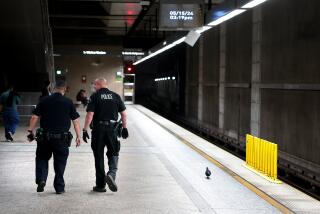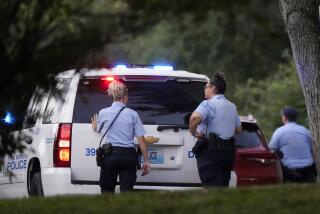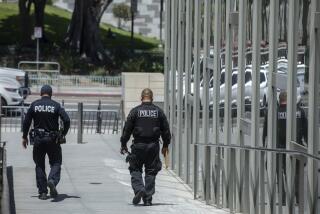Yugoslav Opposition Works to Gain Support of Milosevic’s Police Forces
BUDVA, Yugoslavia — As street protests threatened to end Yugoslav President Slobodan Milosevic’s rule, the key question Thursday was whether the police forces that form the regime’s iron backbone would crack down on the opposition--or join it.
Leaders in Vojislav Kostunica’s 18-party opposition coalition said Thursday night that they had sought a meeting with Vlajko Stojiljkovic, head of Serbia’s feared Interior Ministry, in hopes of swaying his police to their side. Stojiljkovic, who along with Milosevic faces an indictment in The Hague on war crimes charges, refused to meet with them.
In his 13-year rule, Milosevic has built police forces that are 100,000 strong in a republic of only 10 million people. By paying them better than many state workers, and providing them with good housing and other perks, Milosevic turned the police forces into a private army.
During a vicious civil war in Kosovo--a province of Serbia, the main Yugoslav republic--that led to a North Atlantic Treaty Organization air war against Yugoslavia last year, special Interior Ministry police units with military training made up the main forces fighting Kosovo Liberation Army guerrillas. According to international war crimes investigators, the ministry’s units committed the greatest atrocities against ethnic Albanian civilians.
One fear is that Milosevic may be able to call on battle-hardened special police units that served in Kosovo and try to fight his way out of the current crisis, much as Romania’s Communist-era dictator, Nicolae Ceausescu, attempted to do in 1989.
But Ceausescu’s Securitate police were finally overwhelmed, and the Romanian leader was executed on Christmas Day in 1989, along with his wife, Elena. Opposition leaders in Serbia say they don’t think the police will try to crush their uprising just to extend Milosevic’s regime by a few weeks or months.
In fact, even protesters were stunned Thursday by how quickly some police lines collapsed.
In the months leading up to Yugoslavia’s Sept. 24 presidential election, before Kostunica had emerged as opposition leader and his predecessors were largely discredited, members of the student movement Otpor, or Resistance, pressed for freedom. They took to the streets under placards bearing their symbol: a black clenched fist.
Milosevic ordered his police to arrest Otpor activists across Serbia, and they dutifully complied. And pro-Milosevic agents in civilian clothes attacked people wearing Otpor T-shirts.
The presidential election showed that Milosevic had little support--even his government recognized that Kostunica topped the balloting, though it claimed that the opposition leader polled less than 50% of the vote and ordered a runoff election.
But despite past arrests and Milosevic’s fading fortunes, Otpor leaders made a strategic decision to woo the police, movement leader Miljana Jovanovic said in a telephone interview from Belgrade, the Yugoslav and Serbian capital.
“Otpor’s attitude toward the police is that we do not blame them and we do not see them as enemies,” Jovanovic said, before Thursday’s dramatic events. “We know that there are 10 people in Serbia who give out orders, and they are our real enemies.
“I think we will preserve that attitude among most of the people,” Jovanovic said, “because I think it will stop any outbreaks of violence.”
The Yugoslav military has been a much less reliable supporter of Milosevic, largely because its foot soldiers are conscripts doing mandatory national service. In addition, officers are indoctrinated to believe that their role is to defend the nation and stay clear of politics.
As the pressure mounted on Milosevic in recent days, his army chief of staff, Gen. Nebojsa Pavkovic, stood by Milosevic’s side on state television and appeared to be backing the strongman’s claim to power, despite the opposition’s insistence that Kostunica had won more than 50% of the vote Sept. 24 and that Milosevic was trying to steal an election victory from him.
The first serious cracks in the ranks of the police appeared more than a week ago, beginning with the special weapons and tactics team of the 92nd precinct in Belgrade, according to a report Tuesday in the independent daily newspaper Glas Javnosti.
The special police, whose sharpshooting skills would make them useful in any attempt to violently crush street demonstrations, turned in their equipment and said they were leaving because, according to the newspaper, they could “no longer be accomplices in this kind of police work and could not bear the newly created situation” in the aftermath of the election.
Police Col. Zivko Trajkovic, commander of the Serbian Interior Ministry’s Special Anti-Terrorist Squad, was among a number of police officials reportedly fired Sept. 29.
The Belgrade police force’s special units refused for days to wear their regular combat fatigues for crowd control and other street operations, the Glas Javnosti report said, adding that Interior Ministry sources did not rule out replacing prominent officers because the “moderate wing” was considered unreliable.
Another crucial sign that Serbian police were less than enthusiastic about the job of propping up Milosevic came Wednesday, when supporters of striking coal miners at the Kolubara pits about 25 miles south of Belgrade broke through police lines without a fight.
More to Read
Sign up for Essential California
The most important California stories and recommendations in your inbox every morning.
You may occasionally receive promotional content from the Los Angeles Times.










